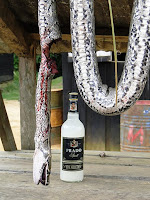 So, it's not cold. There is no snow. My family is not here. And it doesn't smell like pine tree. Still, this year's Christmas has been, so far, pretty amazing. Yesterday I made pierogi and we had a lovely Christmas dinner chez our friends. Today we celebrated in a slightly different way, though. For the first time in my life, Christmas Day was not about me and my family. We decided to spend this special day with the Arc En Ciel kids. And it turned out to be an excellent idea!
So, it's not cold. There is no snow. My family is not here. And it doesn't smell like pine tree. Still, this year's Christmas has been, so far, pretty amazing. Yesterday I made pierogi and we had a lovely Christmas dinner chez our friends. Today we celebrated in a slightly different way, though. For the first time in my life, Christmas Day was not about me and my family. We decided to spend this special day with the Arc En Ciel kids. And it turned out to be an excellent idea!The plan was to take the kids out to the beach, play play play, have a picnic and distribute the presents. The first thing you must know about these kids is that they are absolutely crazy about the beach! Even though they live on the coast, they rarely get an opportunity to get away from the centre. It's a very special treat for them.
First, we splashed around in the water. The old I push you - you fall down - I laugh my head off game was a huge hit. Kids were all over us and, for once, nobody minded. There was hugging and holding hands, and pushing, and climbing on your back. And, careful as I am not to let them get too close to me, I let myself go today. No physical boundaries - Christmas gift for them but, above all, for me.
Then we had a snack. Sandwiches, sweets, biscuits, fruit, juice, Coke... It's an experience to watch these kids eat. They act as if the world was coming to an end, and the only way to save it were by eating as much as you can, as quickly as you can. You can tell them that the food is not going to disappear. They nod and ask for another biscuit, even though they have just stuffed two whole ones in their mouth! Also, here's a useful tip: no quantity of goodies will ever be enough!
Finally, after a professional football match (one of the boys: I'm going to swim. My team has no idea how to play football!), the time for presents came. I'd come up with the following idea: each boy gets a picture of himself, framed and wrapped. As they are crazy about pictures, and I've been taking quite a lot of them during our time together, it was bound to be a success. I thus printed out the photos, put them in the frames that had been brought from Europe by Arc En Ciel volunteer friends, and wrapped them in present paper, with ribbons and name tags - the way it's supposed to be done.
I think for a moment there each and every one of the boys felt special. They got an individual gift each, something that doesn't happen often. Usually, either the centre receives a
 collective present or each boy gets the same package. This time they were the protagonists, all the pictures were different and, most importantly, they could keep them! Consequently, it seems logical that a few boys wanted to prolong the pleasure. And so some wouldn't open their gifts at the beach, guessing what was inside in spite of the photo-frame-shaped object in their hands. Others still would try to put the wrapping paper back on their frames because the present looked so pretty before.
collective present or each boy gets the same package. This time they were the protagonists, all the pictures were different and, most importantly, they could keep them! Consequently, it seems logical that a few boys wanted to prolong the pleasure. And so some wouldn't open their gifts at the beach, guessing what was inside in spite of the photo-frame-shaped object in their hands. Others still would try to put the wrapping paper back on their frames because the present looked so pretty before.And the kids would call Jandro Monsieur Kasia.
There are no words that can describe how I felt for the rest of the day. Touched. Happy. Satisfied. Elated. Heart-broken. Too many emotions.
A friend of mine once said she could not do this kind of work. It would be too painful for her. I cannot disagree, in many ways it is painful. However, it is the kind of pain I can deal with, as long as I get to put a smile on those ebony faces.
What a day! Big thanks to the people who made it possible: Su and Tito (who, starting off as the readers of this blog, became its protagonists), Kathleen (who was extremely generous today), and, of course, Jandro, because he's always there. I dedicate my Oscar to... Oh, sorry, got a bit carried away.
I am going to Mayumba tomorrow, and will not have time to upload any photos until after we get back. But this post will have images, I promise!






























